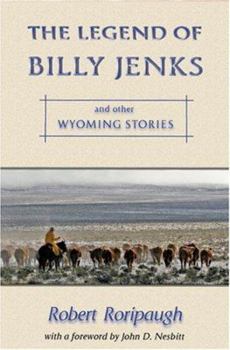The Legend of Billy Jenks: And Other Wyoming Stories
No Synopsis Available.
Format:Paperback
Language:English
ISBN:0931271886
ISBN13:9780931271885
Release Date:August 2007
Publisher:High Plains Press
Length:187 Pages
Weight:0.55 lbs.
Dimensions:0.5" x 6.3" x 8.5"
Customer Reviews
1 rating
Quietly Authentic
Published by Thriftbooks.com User , 17 years ago
In the Fifties, which have become pretty much invisible years to many people, my family traveled a lot -- economy-style in a folding tent trailer except for one trip to the east coast when we stayed in "auto camps" as motels were then called. We ate cereal for breakfast, sandwiches for lunch and for supper we'd stop in some small town on a blue highway (that's the only kind there was in those days) and have either hamburgers or hot beef sandwiches at the local cafe. My dad had trouble taking his foot off the gas, so sometimes we ate in places that were more bar than cafe, because that's all that was open after seven pm. We traveled mostly in the rural West. I was between eight and twelve in those years, old enough to observe and even introspect, but without any very powerful ways to interpret what we saw: small town, ranch and farm people struggling to keep their families together and fed, men drinking to numb their trauma, women frustrated by boredom, and what would now be called poverty though we didn't think of it that way then. None of the glitz and sheen that even the smallest towns flaunt now, but on the other hand, not near so many boarded up buildings and deserted streets. If there was a bar, it always had a red neon martini glass with a green neon olive. The Korean and Cold Wars gripped us, teaching that conformity and group identification offered the only safety. In those years Robert Roripaugh was there in Wyoming, knowing the people and their stories, which he kept in his heart until he was adult enough to spin them into poetry (he was the poet laureate of Wyoming from 1995 through 2002) and fiction, both short stories and novels ("A Fever for Living" and "Honor Thy Father." After service in Japan, post-war, he returned with his wife, Yoshiko, to the University of Wyoming where for thirty-five years he taught creative writing and Western American Literature. He has worked hard to serve and develop Wyoming literature through workshops and seminars around the state. Reading Roripaugh's stories is a little like reading Richard Ford, who writes about Montana and lives here sometimes but is not really from the state, or Raymond Carver, who turns out not to have intended to be famous for minimalism after all. (Evidently it was a style imposed by his editor, Gordon Lish, whether or not that was a good thing.) They are not exciting romantic Zane Grey epics. But they are not like the indigenous writers who are best known at present: Ivan Doig is much more inclined to gentle humor and lapidary prose. Mark Spragg, a Wyoming native, is quite a bit younger, which shows in his stories. Roripaugh is often described as "grounded in reality." But maybe that's not the most interesting thing about this collection of short stories. These stories include some of his earlier works as well as recent stories: each has head-notes that let us know the source of the story and its fate through many rewrites. This anthology amounts to a "story" about being





